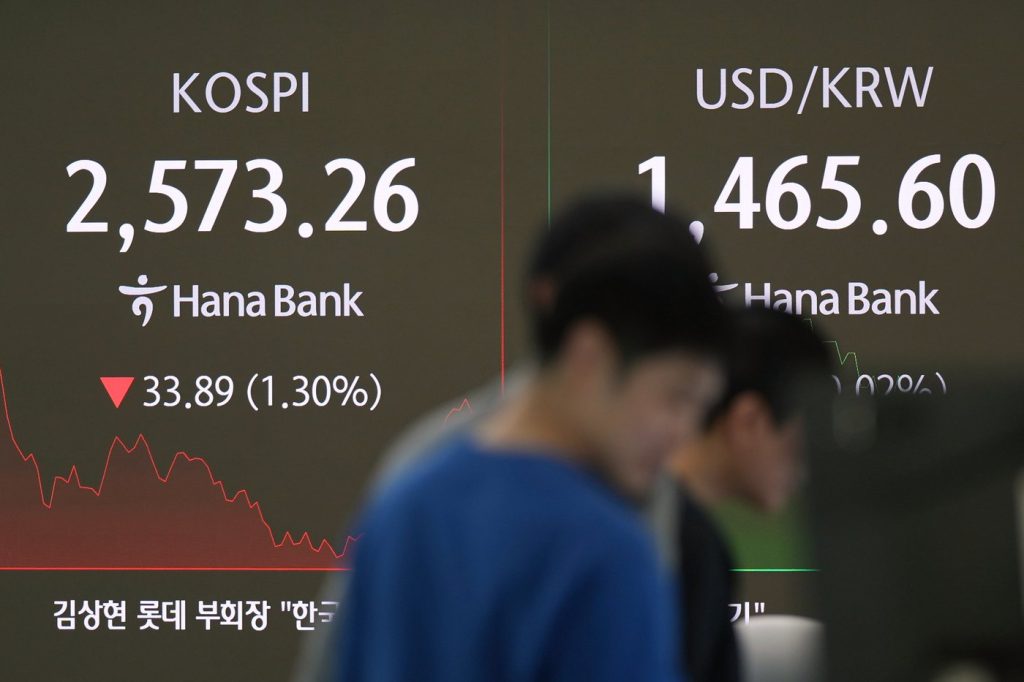HONG KONG (AP) - Asian stocks experienced a mostly lower trend on Friday as investors grappled with the uncertainties stemming from U.S. President Donald Trump's recent tariff announcements. The Tokyo Stock Exchange's benchmark Nikkei 225 index dropped by 2.2%, ending at 36,952.34. This decline was largely a result of significant selling pressure on auto-related shares following Trump's announcement of plans to impose a 25% tariff on auto imports.
Toyota Motor Corp.'s shares fell by 2.7%, while Honda Motor Co. saw a decrease of 2.3%. The situation was compounded by reports indicating that Tokyo's inflation rate had risen to 2.9% this month, raising expectations that the Bank of Japan might increase its key interest rate during its policy board meeting in May.
In South Korea, the Kospi index slipped by 1.8% to 2,559.16, with major automobile manufacturers such as Hyundai Motor Co. and Kia Corp. experiencing declines of 3.6% and 3.1%, respectively. Meanwhile, Hong Kong's Hang Seng Index declined by 0.9%, closing at 23,368.67, and the Shanghai Composite Index decreased by 0.7% to 3,349.68. In contrast, Australia's S&P/ASX 200 index edged up slightly by 0.1%, finishing at 7,978.30. However, Taiwan's Taiex fell sharply by 1.9%, and Bangkok's SET index declined by 0.4%.
On the previous day, Wall Street experienced modest losses as Trump's tariff decisions continued to create both winners and losers among auto stocks. The S&P 500 dropped by 0.3% to 5,693.31, and the Dow Jones Industrial Average fell by 0.4% to 42,299.70. The Nasdaq Composite index also dropped by 0.5% to 17,804.03. General Motors reported one of the sharper losses, sinking by 7.4%, while Ford Motor Co. experienced a decline of 3.9%.
Even U.S. automakers, who manufacture vehicles in the country, are feeling the impact of these tariffs due to the extensive nature of their supply chains across North America and beyond. President Trump has indicated that he aims to boost domestic manufacturing in the United States. However, uncertainties loom over how the U.S. government will assess tariffs on automobile parts, especially those compliant with the free-trade agreements with Canada and Mexico, which are not entirely produced within the United States.
In better news, electric vehicle manufacturers such as Rivian and Tesla appeared to perform better in response to the tariffs, as their production is predominantly based in the United States. Rivian's stock rose by 7.6%, while Tesla's shares gained by 0.4% after an earlier larger increase was moderated.
Additionally, businesses likely to benefit from consumers opting against purchasing new cars experienced gains. Retailers of auto parts saw notable increases, including AutoZone, which rose by 4%, O'Reilly Automotive, up by 3.1%, and CarMax, which recorded a 2.5% increase.
Global stock markets are expected to remain volatile as the April 2 deadline for the implementation of additional tariffs approaches. Dubbed "Liberation Day" by Trump, the day is when he plans to roll out tariffs directed at various trading partners, with the intention that these tariffs will match existing burdens imposed by other countries. Commentator Stephen Innes from SPI Asset Management noted that traders are keenly interested in what lies beyond the "reciprocal tariff curtain."
Despite the uncertainties, there remains an underlying hope that Trump might choose to implement more targeted or less severe tariffs that could minimize adverse effects on the global economy. Nonetheless, discussions regarding tariffs have fostered a sense of caution and pessimism among consumers and businesses, which could potentially impact overall spending and economic health.
Currently, the economy appears stable. Reports from Thursday indicated that there were fewer unemployment benefit applications than economists had anticipated, suggesting the job market is transitioning to a state characterized by slower growth and hiring. Additionally, a second report revealed that U.S. economic growth for the final quarter of the previous year was slightly stronger than initially estimated.
On Wall Street, shares of Petco Health & Wellness surged by 31.6% after the company reported performance results that exceeded analysts' expectations for the most recent quarter. In early trading on Friday, U.S. crude oil prices dipped slightly, with benchmark crude trading at $69.89 per barrel and Brent crude at $73.29 per barrel. The U.S. dollar also experienced some fluctuations, dropping to 150.89 Japanese yen and the euro edging down to $1.0786.










